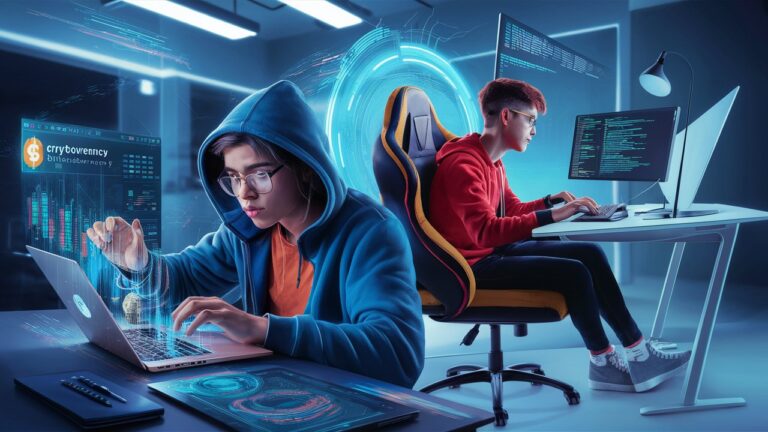In today’s hyper-connected world, the line between play and productivity is fading fast. The digital generation—those who grew up with smartphones, streaming, and social media—are developing skills in unconventional but impactful ways. From building cryptocurrency portfolios to learning Python through interactive games, the new toolkit for success doesn’t always come from traditional education.
Let’s explore how three seemingly different areas—crypto, coding, and casual gaming—are equipping young people with the adaptability and digital fluency they need to thrive in the modern world.
Crypto: A Financial Literacy Revolution
Cryptocurrency has gone from fringe finance to a mainstream topic in under a decade. For Gen Z and young millennials, crypto isn’t just about investing—it’s their entry point into financial literacy, decentralization, and digital sovereignty.
Platforms like Coinbase and Binance have introduced a generation to wallets, two-factor authentication, staking, and market speculation. Unlike traditional banking, crypto forces users to understand risk, responsibility, and self-custody from day one. It’s not unusual to hear university students discussing Ethereum gas fees or NFT royalties between classes.
But it’s more than money. Crypto projects often involve governance models, open-source communities, and smart contracts. These are concepts rooted in transparency and collaboration—skills that align closely with modern entrepreneurship and tech innovation.
Understanding blockchain basics also opens the door to career opportunities in fintech, cybersecurity, and Web3 development. As crypto becomes more intertwined with gaming (think play-to-earn models), the overlap between entertainment and finance becomes even more educational—and lucrative.
Coding: The New Digital Literacy
Coding is no longer the exclusive domain of software engineers. In the digital economy, coding is becoming as fundamental as reading and writing. Whether it’s HTML for a blog, Python for data analysis, or JavaScript for web apps, having even a basic understanding of code is a career booster—and sometimes a career starter.
What’s particularly exciting is how gamification is making coding accessible. Platforms like Codecademy, FreeCodeCamp, and Grasshopper turn complex concepts into interactive lessons. Young learners are engaging with challenges, quizzes, and puzzles that teach logic, syntax, and problem-solving.
Games like Minecraft (with modding), Roblox Studio, and even older platforms like Scratch help children and teens develop computational thinking in creative ways. These experiences build more than technical skills—they teach resilience, experimentation, and iterative learning.
In many ways, coding and casual gaming complement each other. Gamers who learn to script or automate tasks often discover they’re coding without realizing it. And as AI, automation, and data analytics become core to every industry, these foundational coding skills provide a competitive edge.
Casual Gaming: More Than Just Fun
Casual gaming—mobile games, browser games, and short-session console titles—often gets written off as mindless entertainment. But scratch beneath the surface, and you’ll find that these games hone real-world skills: decision-making, pattern recognition, and strategic thinking.
Games like Clash Royale, Among Us, and Stardew Valley require players to analyze systems, collaborate with others, and adapt to changing conditions. Puzzle games and time-management apps challenge cognitive speed and multitasking—skills vital in fast-paced work environments.
And just like in gambling, casual games often involve probability, odds, and risk assessment. This has even led to crossovers where gaming principles enhance betting strategies. One notable example is the golden eagle baccarat strategy, which adapts concepts from game theory and probabilistic modeling—a familiar territory for anyone used to optimizing in-game decisions.
Additionally, the rise of “serious games” in education proves that gaming is more than escape—it’s a tool. Schools are using interactive storytelling and simulations to teach history, science, and even ethics. Meanwhile, casual games are helping young adults improve their mental agility and comfort with digital interfaces.
Final Thoughts
The digital generation is redefining how skills are acquired. Crypto teaches financial independence, coding nurtures creativity and logic, and casual gaming sharpens critical thinking—all through platforms that are accessible, engaging, and often free.
For students, young professionals, and lifelong learners alike, these three domains form a modern skillset that’s as relevant as traditional academics. The challenge now is recognizing and validating these alternative learning paths—at home, in schools, and in the workplace.
In a future where innovation rewards agility, those who can combine financial literacy, technical know-how, and strategic play are the ones most likely to succeed. And that’s a game well worth playing.
